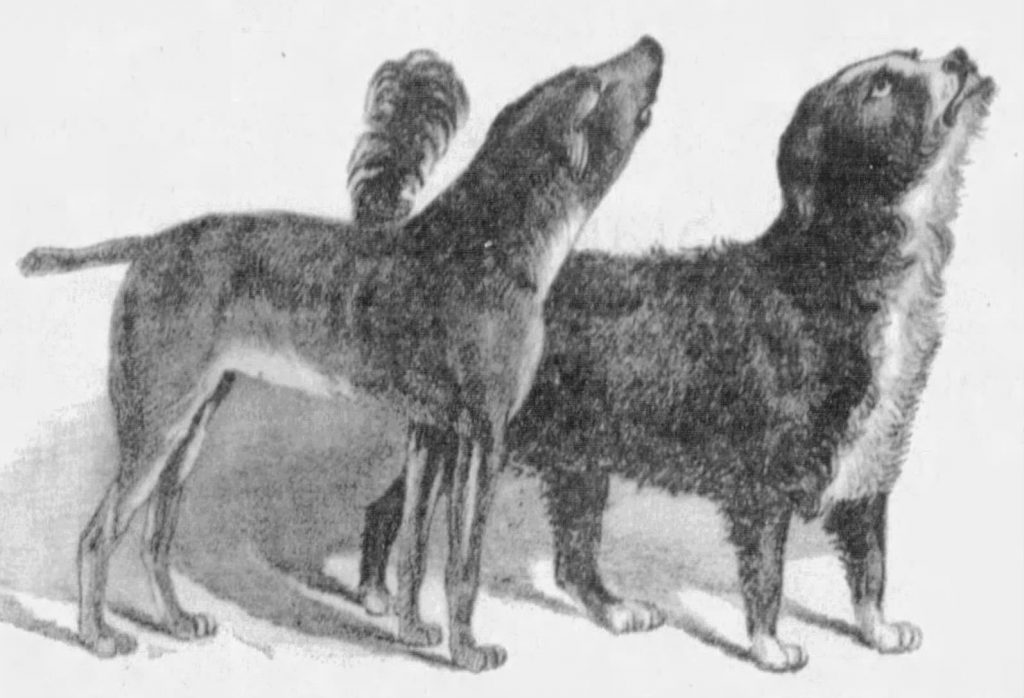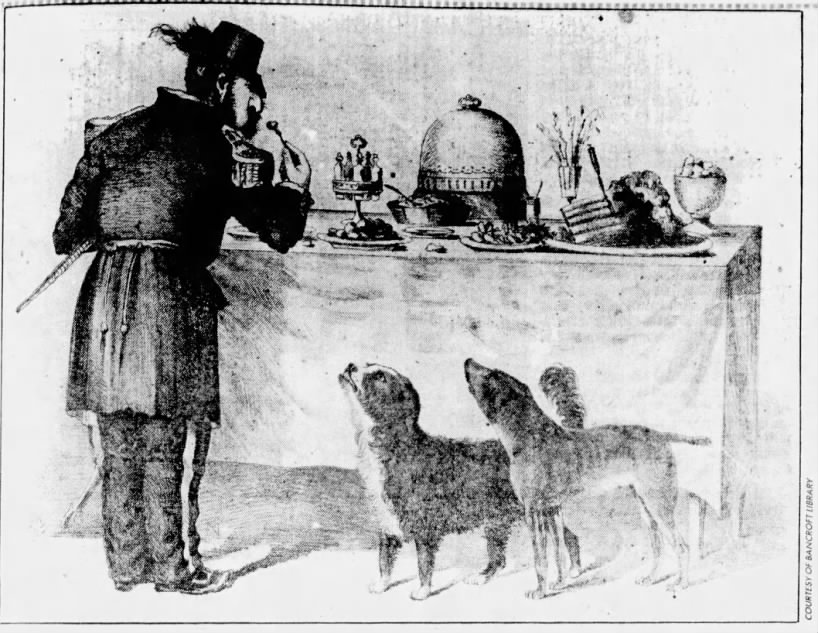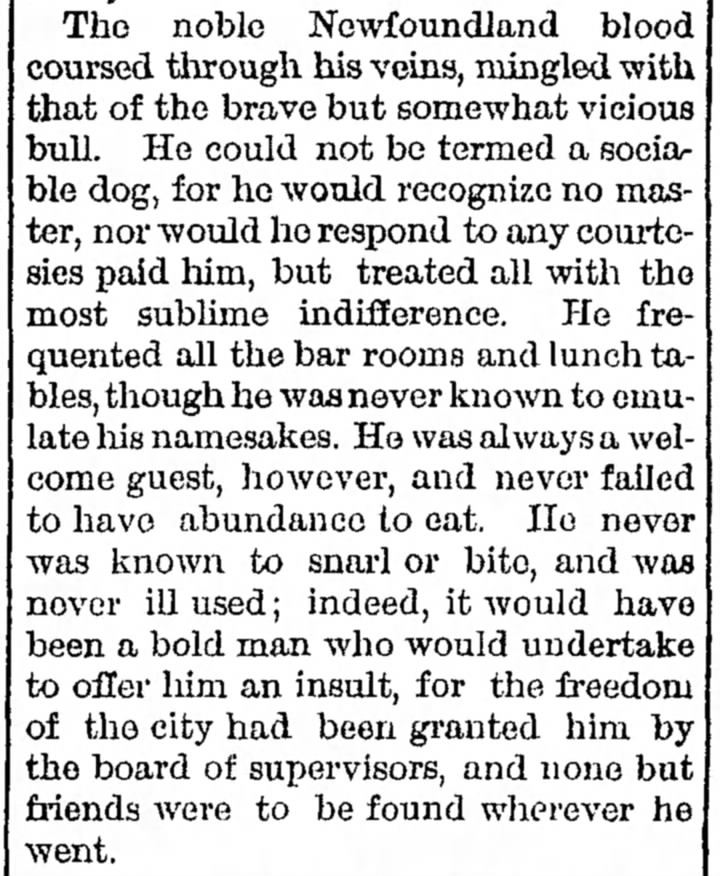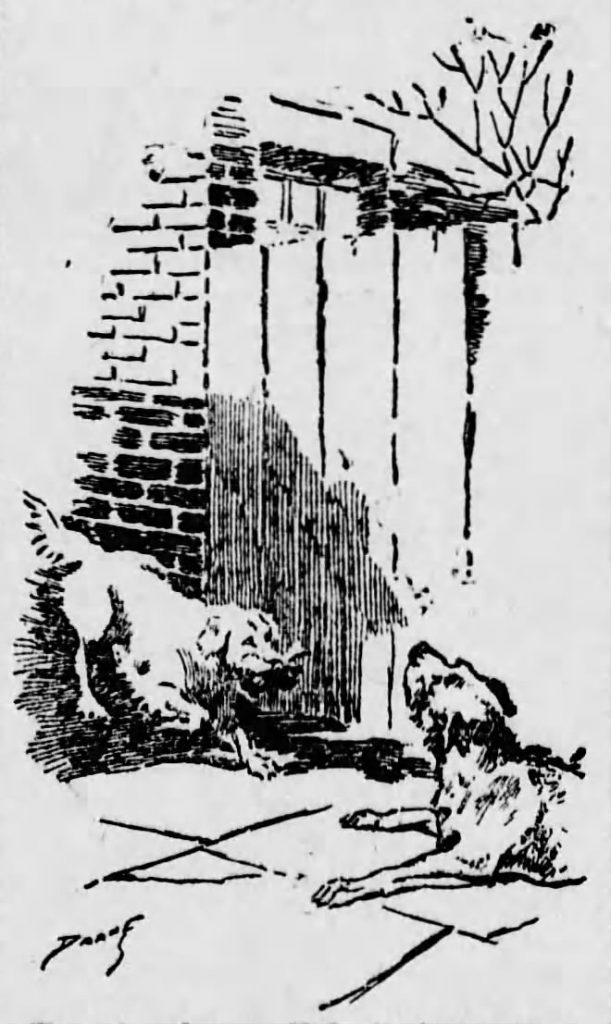
In the mid-1800s, an overwhelming number of stray and feral dogs prompted some pretty brutal anti-stray policies, especially in larger cities. Yet despite these turbulent circumstances, two San Francisco street dogs became so beloved that they remain furry local legends to this day.
Their story begins in 1861 with our first hero, a “coally black,” white-chested Newfoundland mix. Though some accounts give him a somewhat romanticized roguish past of crime and “canine outlawry,” most say he simply showed up in San Francisco one day. Lacking both home and family, he began living off the scraps and scratches of kind shopkeepers. This earned him the name “Bummer,” an insulting term commonly used at the time (with varying degrees of vitriol) for people who relied on the charity of others.
His kind but indifferent personality, along with impressive rat catching skills, quickly made Bummer a welcome addition to the area. He became a familiar sight outside Martin & Horton’s saloon, a spot he soon shared with another furry friend.
As the story goes, Bummer came across a badly injured stray and took him into his care. The smaller dog wasn’t expected to live, but his loyal nurse brought him food, encouraged him to eat, and slept next to him to keep him warm. The new dog’s miraculous recovery led to him being dubbed Lazarus. Bummer’s generosity made him even more popular, and Lazarus became a constant figure at his side.
Newspaper reporters also frequented the saloon, and accounts of the dogs’ adventures became a regular sight in the papers. The stories extoled their gentle personalities, their unity of purpose, their mutual protectiveness, and their ability to win over everyone they met. In one instance, Lazarus was rounded up by a new dogcatcher and the horrified locals rallied together to demand his release. And when San Francisco’s city council passed a “dog law” to address the numerous strays, both Bummer and Lazarus were made exempt.

(The San Francisco Examiner, 1986)
Many of the stories implied a connection between the dogs and Joshua Norton, a San Francisco eccentric who called himself “Emperor of the United States and Protector of Mexico.” The trio’s activities were well-documented in cartoons and articles from the 19th century. But the two dogs were never the pets of “Emperor Norton,” as he was known. In fact, the Emperor was offended by the cartoons, which he saw as a blow to his dignity. In reality, Emperor Norton and the two dogs were only ever together in drawings and imaginations.
Lazarus died in October 1863. While some papers chalked it up to old age, others claim he was poisoned. Bummer lived another two years before a kick brought about his own sad end and he joined Lazarus “in dogland.”
Years later, the stories of Bummer and Lazarus live on. In 1992, 130 years after their deaths, the two were honored with a plaque in Transamerica Redwood Park. They were even featured by a local distillery whose labels paid homage to the city’s history (there was also one for Emperor Norton). It’s a mark of the impression these two dogs made that their tale continues to be told, thanks in no small part to the headlines that helped make them famous.
There’s so much more about Bummer and Lazarus than could be shared here. Head to Newspapers.com™ for more articles about these two good boys, Emperor Norton, and other fun San Francisco history. Try a search today!




That’s interesting about the word ‘bummer’. My grandmother use to say we’d go out “bumming” which another grandmother called “window shopping”. Both terms meant to look but not buy.
My mother used exactly the same term with the same meaning!
‘When springtime has come/Oh won’t we have fun/We’ll get out of jail and we’ll go on the bum’ -‘ Hallelujah, I’m a bum,
Hallelujah, bum again,
Hallelujah, give us a handout
To revive us again.’
American folk song.
I thought I might be the only one who remembered that song. I played the 78rpm record that I got from my aunt many time and can only remember the chorus. “Bums” were men who rode the rails (a large field away from our house)and would come to our back door looking for food. They were harmless, but we were frightened by the “gypsies” who would encamp in that field almost every summer and who were rumored to steal children, so we were kept indoors while they were there
My Granny taught us kids that song (only part I remember was the chorus). I used to sing it to my granddaughter & both my daughters.
The only verse I remember is…
Oh I went to a house, and I rapped at the door, and the lady said bum bum, you’ve been here before!
Sorry about the commer ial, but here you go!
https://youtu.be/oXAaH6wy-Gc
I remember that song well. My father and uncles used to sing it often!
We have a Bummer lamb, so called because it was rejected by it’s mother. It only survived because it was hand fed from birth and force fed to the mother’s nipple for a short time.
I found the story touching but poisoning and dying by a kick was so sad. I am sure they are together in dog heaven… We use the term bummer to comment on a bad or sad event happening. For example, I got a flat tire, what a bummer…
According to etymonline.com, the term “bum” dates back to 1863 and means to loaf and beg–consistent with the meaning in this story. I remember my mother say, “I’ve been out bumming” which had nothing to do with begging or looking for a hand-out, but rather just out for a drive or trip with no significant destination or purpose. That would be more consistent with an earlier post about going “window-shopping”.
yea i remember using the term “bum around”, akin to hang around, nothing productive, or travel a bit—bum around downtown, for instance. I have no idea how “bummer” may have evolved to its modern use from this story’s use tho!
The word ‘Bummer’ is used frequently in Australia to mean, that’s to bad. For example, if someone says to another person, I missed the bus by 2 minutes the other person would say, “that’s a bummer”.
It’s used the same way in the US or maybe just in Michigan where I’m from.
In Georgia, too!
In Idaho too!
I think you may find that “bummer”, meaning something that is a disappointment, or something turning out bad, is a more recent adaption of the word that became popular during the 60’s and 70’s (the hippie eras). Cheech and Chong used it frequently in their routines as well.
Same in Alabama
To be a bum would be someone who is up to nothing, doing nothing productive…not quite the same as a beggar, but often used interchangeably. We often said we were just bumming around…out looking around (in line with the window shopping description) or just doing nothing overly productive…taking it easy, loafing, relaxing.
Great story about two wonderful dogs that met with sad endings. Our shared connections with them, the writers who made them memorable–even from more than 150 years ago–as well as our own connection in remembering how we all used the word bumming, makes this story heartwarming.
I loved the story about the two dogs, especially how they bonded with each other. I didn’t care for the way that they “crossed the rainbow bridge” though, poisoning and being kicked. They should have passed more comfortably since they kept the rodents away!
In NC we usually said “bum around” to express having fun and doing nothing special. I had never heard of the song until I read about it here.
What a story rip boys! Sad ending though!
Under the second cartoon, it lists the date as 1986.
Is that a mistake that needs to be corrected?
No, it was pulled from Archives.
I never quit smoking, I just quit buying. I have been bumming ever since.
Sadly, the state of animal abuse lives on through the centuries. Animals are still considered disposable by owners and when tired of the animal the sad things are abandoned. The “lucky” ones are taken to SPCA or other organizations to be re-homed. The unlucky ones suffer an unfortunate future.
Please be kind to all animals.
* I really enjoy reading past Newpaper articles and the Dog story did not disappoint, so thank you for sharing. As to the name “Bummer”, it seems to have been used loosely, as a descriptive word name, example brown dog named “Brownie” or 3-legged dog named “Lucky”. *To add, since I was a child, growing up in a suburb, everyone used and understood the slang term “bumming”. Bum replaced the words – can I have? Examples: Bumming a dollar if you were short of lunch money. Can I “bum” a dollar, I forgot my lunch? Can I “bum” some fries, I’m starved? Can I “bum” a ride home, I missed my bus? Where do you live, can I “bum” a ride?